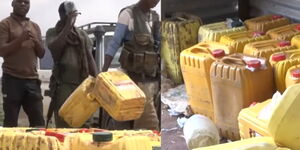The International Monetary Fund (IMF) has projected a spike in fuel and gas prices in the coming months owing to market volatilities in the Middle East.
In its World Economic Outlook report released on Tuesday, IMF expressed that the ongoing conflict between Israel and Hamas posed potential risks to the Middle East market which is among the major exporters for oil and gas.
On the other hand, the global financial body indicated that the escalating crisis along the Red Sea, which is a pathway for goods, will also contribute to the anticipated spike.
Consumers are expected to cover the extra costs which will be passed down to them by shipping lines attacked by Houthi rebels.
"The conflict between Gaza and Israel could escalate further into the wider region, which produces about 35 per cent of the world’s oil exports and 14 per cent of its gas exports.
"Container shipping costs have already sharply increased, and the situation in the Middle East remains volatile. Further geoeconomic fragmentation could also constrain the cross-border flow of commodities, causing additional price volatility," read the report in part.
On the other hand, the Economist Intelligence Unit (EIU) concurred with the IMF, detailing that the spike in prices will still be witnessed despite the drop in global prices in the last few months.
According to the EIU, increased demand for oil among developing countries such as Kenya will further influence the pricing in the global market.
"Global oil demand will as well put a floor under prices and is set to reach record highs in 2024 and in subsequent years as consumption in the developing world continues to increase.
"Although we expect crude oil prices to remain volatile, they should mostly trade at about US$80/barrel, essentially where they began the year," EIU explained in its Commodities Outlook for 2024.
Meanwhile, the Energy and Petroleum Regulatory Authority (EPRA) is expected to review the current pump prices in two weeks.
For January, EPRA reduced petrol and diesel prices by Ksh5. Kerosene prices on the other hand dropped by Ksh4.82.
Meanwhile, Kenyans are currently refilling a 6kg gas cylinder at an average of Ksh1,400 and Ksh2,900 for the 12kg one.












